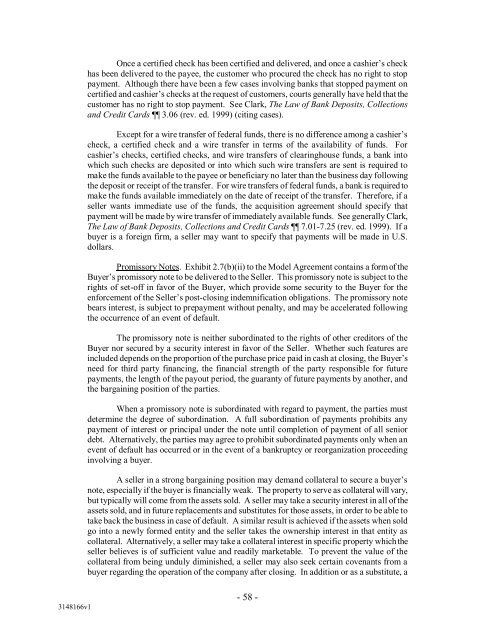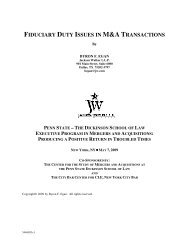asset acquisitions - Jackson Walker LLP
asset acquisitions - Jackson Walker LLP
asset acquisitions - Jackson Walker LLP
Create successful ePaper yourself
Turn your PDF publications into a flip-book with our unique Google optimized e-Paper software.
Once a certified check has been certified and delivered, and once a cashier’s checkhas been delivered to the payee, the customer who procured the check has no right to stoppayment. Although there have been a few cases involving banks that stopped payment oncertified and cashier’s checks at the request of customers, courts generally have held that thecustomer has no right to stop payment. See Clark, The Law of Bank Deposits, Collectionsand Credit Cards 3.06 (rev. ed. 1999) (citing cases).Except for a wire transfer of federal funds, there is no difference among a cashier’scheck, a certified check and a wire transfer in terms of the availability of funds. Forcashier’s checks, certified checks, and wire transfers of clearinghouse funds, a bank intowhich such checks are deposited or into which such wire transfers are sent is required tomake the funds available to the payee or beneficiary no later than the business day followingthe deposit or receipt of the transfer. For wire transfers of federal funds, a bank is required tomake the funds available immediately on the date of receipt of the transfer. Therefore, if aseller wants immediate use of the funds, the acquisition agreement should specify thatpayment will be made by wire transfer of immediately available funds. See generally Clark,The Law of Bank Deposits, Collections and Credit Cards 7.01-7.25 (rev. ed. 1999). If abuyer is a foreign firm, a seller may want to specify that payments will be made in U.S.dollars.Promissory Notes. Exhibit 2.7(b)(ii) to the Model Agreement contains a form of theBuyer’s promissory note to be delivered to the Seller. This promissory note is subject to therights of set-off in favor of the Buyer, which provide some security to the Buyer for theenforcement of the Seller’s post-closing indemnification obligations. The promissory notebears interest, is subject to prepayment without penalty, and may be accelerated followingthe occurrence of an event of default.The promissory note is neither subordinated to the rights of other creditors of theBuyer nor secured by a security interest in favor of the Seller. Whether such features areincluded depends on the proportion of the purchase price paid in cash at closing, the Buyer’sneed for third party financing, the financial strength of the party responsible for futurepayments, the length of the payout period, the guaranty of future payments by another, andthe bargaining position of the parties.When a promissory note is subordinated with regard to payment, the parties mustdetermine the degree of subordination. A full subordination of payments prohibits anypayment of interest or principal under the note until completion of payment of all seniordebt. Alternatively, the parties may agree to prohibit subordinated payments only when anevent of default has occurred or in the event of a bankruptcy or reorganization proceedinginvolving a buyer.A seller in a strong bargaining position may demand collateral to secure a buyer’snote, especially if the buyer is financially weak. The property to serve as collateral will vary,but typically will come from the <strong>asset</strong>s sold. A seller may take a security interest in all of the<strong>asset</strong>s sold, and in future replacements and substitutes for those <strong>asset</strong>s, in order to be able totake back the business in case of default. A similar result is achieved if the <strong>asset</strong>s when soldgo into a newly formed entity and the seller takes the ownership interest in that entity ascollateral. Alternatively, a seller may take a collateral interest in specific property which theseller believes is of sufficient value and readily marketable. To prevent the value of thecollateral from being unduly diminished, a seller may also seek certain covenants from abuyer regarding the operation of the company after closing. In addition or as a substitute, a3148166v1- 58 -
















